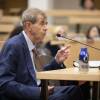Voters state-wide put a pause on charter school expansion, but the issue is making a veiled appearance in Boston's mayor's race. City Councilor Andrea Campbell, defended herself Tuesday against the race's first decisively negative radio ad, which touches on the issue and calls into question Campbell's concern for special needs students.
The ad, launched last Thursday, features a deep, somber voice that points to the pro-charter school "special interests" donors bankrolling Campbell's Better Boston Super PAC and concludes by arguing Campbell is "on the wrong side" of a choice between special interests and special needs students.
The ad was launched by the Hospitality Workers Super PAC, which supports acting Mayor Kim Janey's candidacy. An official with the organization said it is scheduled to run through next week's Sept. 14 preliminary election.
Campbell, who supported the ultimately unsuccessful charter school expansion question in 2016, called the ad "disappointing," "upsetting" and untruthful.
"Our voters deserve a choice that is based on facts and information that is real, not misinformation and certainly not lies," Campbell said at a press conference in Boston's Grove Hall neighborhood.
Campbell called on Janey to disavow the Super PAC, which has raised nearly $760,000 since its June launch.
In response, Janey's campaign called Campbell's comments "the height of hypocrisy," given that Campbell frequently levies criticism at the acting mayor's handling of city issues.
"Instead of attacking hotel workers for expressing their political views, Campbell should condemn the dark-money, right-wing millionaires who want to privatize our public schools and have poured millions of dollars into TV ads supporting Campbell’s campaign,” said Kirby Chandler, Janey's campaign manager, in a statement.
Chandler declined to comment on whether the campaign would disavow the Hospitality Workers' ad.
Campbell's campaign did not indicate plans to disavow Better Boston's support.
The issue of charter schools has historically been a political flash point in Boston, with opponents drawing a distinction between them and Boston Public Schools.
“For decades, the opponents of charter public schools in Boston have falsely claimed that these schools aren’t public schools, when in fact they were established by the landmark 1993 Massachusetts Education Reform law as a public school choice option, which has led the nation in serving the largely poor and minority students enrolled in Boston’s charter schools,” said Jamie Gass, director of education and research at the Pioneer Institute, a Boston-based think tank. Pioneer has long supported charter schools.
“This inaccurate, politicized posturing has persisted among anti-charter public school mayoral candidates who are merely pandering for the teacher union support, all of which is frankly tangential to the educational interests of Boston’s schoolchildren,” Gass said.
Juan Cofield, who chaired the anti-charter group Save Our Public Schools in 2016, rejected the idea that charter schools are wholly the same as public schools.
"There's no question that charter schools drain resources of traditional public schools ... and that's a huge problem," he said, pointing to the large proportion of Boston students who attend "traditional" BPS schools.
"I think the citizens of Boston want to be able to hold teachers and administrators of all of the schools in Boston accountable through the school committee and charter school teachers and administrators are not accountable to the Boston School Committee."
Cofield rejected the idea that charters are a "major issue" in the mayor's race, but the issue is costing Campbell support among some political circles, including the highly active Jamaica Plain Progressives group, which did not endorse a mayoral candidate due to split support.
"It's definitely an issue for me, personally," said Krista Magnuson, a JPP member and BPS parent who opposed Question 2, a ballot question to expand charter schools in Massachusetts that was defeated in 2016. For her, Campbell’s support of Question 2, coupled with her super PAC financiers made her a non-starter candidate.
"I don't mean to be insensitive to the reasons people might pick charter schools for their children," she said. "But, in terms of greater systemic support for charter schools, I can't do that," reiterating Cofield's point about draining resources from public schools.
Magnuson added that “anyone who knocked doors in 2016 for the 'No On 2' campaign to try to protect BPS from the monetary effect that would've been felt… they're going to have a hard time accepting a candidate who's still taking money from those forces who were our opposition five years ago."
She is still undecided about who she will support during next week's preliminary election, she said.
When asked Tuesday whether charter school expansion is a positive part of the future for Boston, Councilor Campbell said no.
"As a mayor, you don't even have control over that," she said. "My job and my responsibility as a councilor and as a mayor will be to improve Boston Public Schools so our families don't have to go anywhere else."
Asked about pro-charter school Super PAC financiers, Campbell pointed to the late Nonnie S. Burns, a donor widely known for her legal career and support for abortion rights.
Campbell said the idea that donors are investing in her candidacy because of "some misinformation” is “just not true."
"My focus as mayor will absolutely be to improve Boston Public Schools so our children don't have to choose another system," Campbell said.
Supporters who appeared with Campbell Tuesday said Campbell's support of Question 2 is not bothersome.
"No, not at all," said Kathy Gabriel, a Dorchester resident whose two grown children were bused in the METCO program.
Gabriel, who is originally from the island nation of Trinidad and Tobago, said the turmoil from Boston's school desegregation efforts in the 1970s inspired many Boston families to seek education alternatives for their students.
"I think anyone who wants to send their children to school, they can choose wherever they want to send their child," she said, pointing out the once-struggling Jeremiah Burke School just blocks away from Campbell's press conference.
"If you don't want us to have charter schools, you need to better the public schools," Gabriel said.





